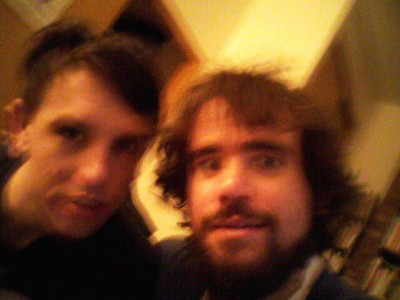
If you really want to understand Occupy Wall Street, you have to talk to the poets.
One night last week, late, after ducking out of a birthday party, we wandered down Broadway like we sometimes do now, looking to extend the evening a bit, see what was doing in the park.
Zuccotti was quiet, but charged with energy as it had been for a month and counting. Many of the sleeping bags were already lumpy and zipped tight. Some were moving gently. The library was closed, covered with blue tarps. But two of the librarians, who were also the poets, were still kicking it. They met three weeks ago and are now best friends, they agreed.
These were Stephen Boyer, 27, a former model and paid dominatrix, and Filip Marinovich, 36, a sometime associate professor of poetry.
Not that any of that really matters anymore. “Hierarchies are bullshit,” Mr. Boyer said. In the last three weeks, he had met celebrities, philosophers, politicians—then curled up under a table to await the next unknowable day. “I’m in the most uncomfortable situation I’ve ever been in in my life, and I have more access to the world than ever.”
Sometimes things are their opposites. Mr. Boyer learned this doing his other job, tag-teaming with his girlfriend, dominating people for money. This is physical work, no getting around that, but it’s also psychological. Mostly it’s about power and how to flip it. Good training, actually, for a member of a revolutionary movement.
Mr. Boyer and his girlfriend moved back to the states from London just a few weeks ago, and they were staying in a hotel overlooking ground zero, preparing for a trip to DC, a business trip. Lots of clients down there—all the doms know it’s the best place in the country to beat people and humiliate them and maybe fuck them with a strap-on for money.
When he reunited with his New York friends, they were going on and on about Occupy Wall Street. “I was like, ‘Let’s get a fucking drink. I haven’t seen you in forever.’ Like, whatever. I’ve been to a zillion protests. I really expected nothing.”
The next day, though, he wandered over to Zuccotti Park. After walking around for five minutes, he recalled, “I just started crying. I was like, This is not like anything I’ve ever seen. It’s what we’ve always wanted to be happening but never figured out how to do.”
Mr. Marinovich agreed. “I gave up on this a long time ago, and yet here it is,” he said.
+++
Of course we asked them about what everyone outside this movement—especially members of the media—seems want to talk about, and nobody on the inside is particularly concerned with: What do you all want? What are the demands? How do you know when you’ve won and can go home?
The poets were polite. They tried to answer. They were tired, as everyone is down there. Running on pure adrenaline. But these were the wrong questions, the ones you ask when you don’t yet get it. These were the questions of the world outside the park—the world of prose. Occupy Wall Street is actually, it turns out, occurring in the realm of poetry and spirit. It’s a sort of waking dream. Which is why it’s so strangely powerful and cannot be sneered away or shoveled over with cynicism (not that we didn’t try) or kettled into history, and may even survive the winter in New York.
“Demands will grow,” Mr. Boyer assured us calmly, with a patience we immediately envied, as we had not felt patient like that in a very long time. He was tall and young, and wore mostly black and didn’t seem very much like a sadist at all. “Demands will eventually come. But this is a space for learning. I’ve learned more here in the last two weeks than I have in all those years of college.”
That’s not a dig on the University of San Francisco, where Mr. Boyer majored in creative writing and sociology. The degree didn’t get him far, though, so he has done what he had to do for money, some good, some not so good. He walked the runway last year in London for Ziad Ghanem, for instance, the designer widely viewed as the creative heir to Alexander McQueen. Mr. Ghanem placed volumes of Mr. Boyer’s poetry on every seat in the front row, and Mr. Boyer’s picture turned up in British Vogue. That was the good job.
But it seems like a different life now. He no longer knows the person in those pictures.
In his 1985 cult anarchist treatise T.A.Z., Hakim Bey, aka the poet Peter Lamborn Wilson, described what he dubbed the temporary autonomous zone: “a guerrila operation which liberates an area (of land, of time, of imagination).” Which is as good a description of Occupy Wall Street as any.

Such zones have flourished, however briefly, around the world, often in secret, Mr. Bey wrote, but in in contemporary America he thought such a space would most likely emerge after three conditions were met. First, people needed to understand not only how the State (Wall Street, the One Percent, whatever) had enslaved them but also “the ways in which we are ensnared in a fantasy in which ideas oppress us.” When the Slovenian philosopher Slavoj Žižek showed up in the park a few weeks back, he compared this process of awakening to the John Carpenter movie They Live, in which the protagonist, Nada, finds a pair of special sunglasses which reveal that the advertising billboards all around him carry hidden messages: submit, stay asleep, conform, consume. The dollar bill? This is your god. (And spoiler alert: the rich are all aliens.)
The second condition was that the internet would need to evolve into a useful tool of dissent and organization.
And third, Mr. Bey wrote, “The State must progress on its present course in which hysterical rigidity comes more and more to mask a vacuity, an abyss of power.”
Check, check, check.
+++
It was windy. The blue tarps were whipping around. Mr. Boyer was asked another of those questions a reporter might ask, an outside-the-zone question. We were just visiting, after all.
“Ever have any famous clients?”

